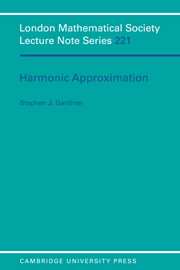Book contents
- Frontmatter
- Contents
- Preface
- 0 Review of thin sets
- 1 Approximation on compact sets
- 2 Fusion of harmonic functions
- 3 Approximation on relatively closed sets
- 4 Carleman approximation
- 5 Tangential approximation at infinity
- 6 Superharmonic extension and approximation
- 7 The Dirichlet problem with non-compact boundary
- 8 Further applications
- References
- Index
Preface
Published online by Cambridge University Press: 17 September 2009
- Frontmatter
- Contents
- Preface
- 0 Review of thin sets
- 1 Approximation on compact sets
- 2 Fusion of harmonic functions
- 3 Approximation on relatively closed sets
- 4 Carleman approximation
- 5 Tangential approximation at infinity
- 6 Superharmonic extension and approximation
- 7 The Dirichlet problem with non-compact boundary
- 8 Further applications
- References
- Index
Summary
The year 1885 has a special significance in the history of approximation theory. It was then that Weierstrass published his famous result which says that a continuous function on a closed bounded interval of the real line can be uniformly approximated by polynomials. The same year saw the birth of holomorphic approximation in the celebrated paper of Runge [Run]. Given an open set Ω in the complex plane C, which compact subsets K have the property that any holomorphic function defined on a neighbourhood of K can be uniformly approximated on K by functions holomorphic on Ω? Runge's Theorem supplies the answer: precisely the sets K such that Ω\K has no components which are relatively compact in Ω. Since Runge's original work holomorphic approximation has developed into a significant research area. We mention particularly the contributions of Carleman [CarT], Alice Roth [Rot1], [Rot3], Mergelyan [Mer], Arakelyan [Ara1] and Nersesyan [Ner]. A helpful account of these and other results can be found in the book by Gaier [Gai]. The purpose of these notes is to give a corresponding account of the theory of harmonic approximation in Euclidean space Rn (n ≥ 2).
The starting point in the history of harmonic approximation is not as easy to identify. In the case of approximation in higher dimensions, the paper of Walsh [Wal] in 1929 seems a reasonable choice, but for approximation in the plane mention must also be made of work of Lebesgue [Leb] in 1907.
- Type
- Chapter
- Information
- Harmonic Approximation , pp. xi - xivPublisher: Cambridge University PressPrint publication year: 1995

